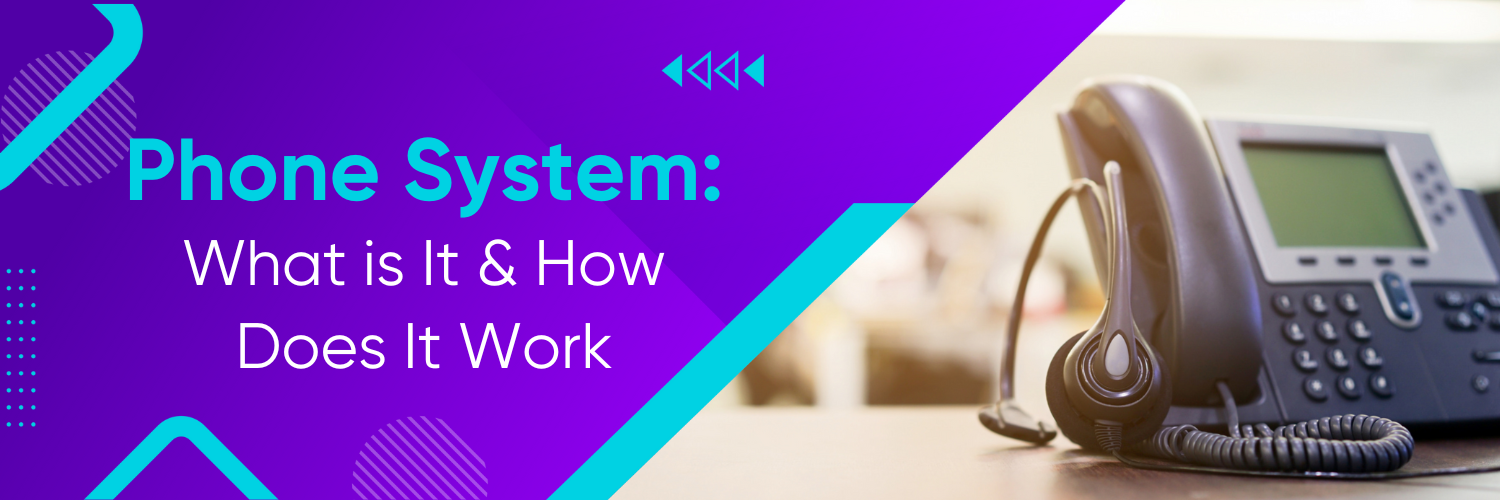Communication has come a long way, thanks to the telephone system. It’s what keeps us connected, whether we’re chatting with coworkers in the office or calling friends around the world.
No matter where you are, phone systems keep us all connected with just a tap. But what exactly is a phone system? Let’s find out.
What is a Phone System?
A phone system is like the brain behind making and receiving calls. It’s a mix of hardware and software that’s changed how we talk to each other. Whether it’s a simple home setup or a big company network, it’s what keeps us connected. With just a tap, you can talk to someone in real-time, whether it’s a voice call, a group chat, or even seeing each other’s faces on video calls.
Types of Phone Systems

The modern business world offers a range of telephone system options, from analog to digital to Voice over IP (VoIP).
- Analog systems use physical cables for calls.
- Digital systems handle multiple conversations on one line.
- VoIP systems use the internet for audio and video calls, making communication even better.
Analog Phone Systems
Analog phone systems are a vital part of phone networks, alongside digital and VoIP systems. They use electrical signals to carry voice over the phone network through copper wires. Key components include the phone line, switch, and adapter: the line connects your phone, the switch links to other systems, and the adapter converts signals for internet transmission.
Analog systems are popular in businesses and homes for their reliability, affordability, and ease of setup. They’re less susceptible to signal interference, offering more consistent service. Plus, they’re more secure since they don’t transmit data over the internet, keeping calls private. Overall, analog systems provide dependable and secure phone service, instilling confidence in users.
Digital systems
Digital phone systems are a modern upgrade from analog ones, bringing several benefits. Instead of electrical signals, they use digital signals, delivering clearer audio even in noisy places.
Businesses love digital systems for their cool features. They let you transfer calls between extensions, setting up a smooth internal phone setup. This boosts communication and customer service.
Plus, digital systems can team up with other business tools like CRM or accounting software. This means quick access to customer info during calls, making service better and everything run smoother.
Voice over IP (VoIP)
VoIP, or Voice over IP, is a modern business phone system that runs on the internet. It lets businesses make and get calls over their internet connection and offers cool features.
Compared to old-school phone systems, VoIP has some big perks. It’s cheaper because you don’t need extra gear, and it’s a breeze to set up. Plus, it grows with your business, so it’s always the right size.
VoIP packs features traditional systems can’t match. You can link it with CRM for fast access to customer info and do conference calls for smooth teamwork, even from afar.
Plus, VoIP calls sound way better. They use digital audio, so chats are clear and solid, no matter how far. Great for international calls! And with cloud connections, you can store and check call records anytime.
Features of Phone Systems

Call Forwarding
- Easily transfer calls from one line to another, perfect for businesses routing calls between departments.
- Convenient for staying connected while away from the office, allowing calls to be forwarded to home or cell phones.
- Simplifies call transfers between employees and ensures uninterrupted communication.
Conference Calls
- Modern solution for keeping everyone connected, enabling multiple participants to join a call from anywhere.
- Improved sound quality and connectivity compared to traditional methods.
- Features include muting, recording, and easy troubleshooting, enhancing collaboration and efficiency.
Automated Attendant
- Allows customers to access services without operator assistance, presenting a menu of options upon calling.
- Recognizes voice commands for seamless navigation and language preferences for improved customer experience.
- Enhances customer service by directing calls efficiently and providing automated assistance.
Benefits of Phone Systems

Increased efficiency
Having a phone system offers numerous benefits to businesses. One of the most significant among them is increased efficiency. With the help of modern phone systems, businesses can handle more calls in less time, allowing them to dedicate their resources to other important tasks.
Cost savings
- Reduce long-distance costs by using the phone system for calls over the Internet, saving significantly.
- Automate customer service and sales processes with automated systems, reducing the need for manual labor and cutting personnel costs.
- Utilize voicemail and digital services to store messages digitally, eliminating paper and traditional storage costs, resulting in savings for the business.
Improved Customer Service
- Automated services like voicemail and attendants save time for both customers and agents, providing quick answers without long waits.
- Multi-line support allows faster customer reach and easier call transfers, ensuring quick connections to the right agent.
- Call routing and queuing direct customers to the appropriate department or agent promptly, reducing wait times and enhancing efficiency.
Phone System Components

Handsets
Handsets are crucial components of phone systems, available in various designs to suit different preferences.
The corded type, common in offices, ensures reliability with its wired connection.
Cordless handsets offer mobility as they connect wirelessly, while ergonomic handsets prioritize user comfort during long calls with adjustable features.
Mobile handsets with Bluetooth connectivity enable calls from anywhere, meeting diverse needs from traditional to modern designs.
Key systems
Key systems are pivotal in modern business phone setups, streamlining communication with features like caller ID and call forwarding.
Particularly advantageous for small businesses due to their affordability and easy setup, key systems offer flexibility through customization. Reliable even during power outages, they enhance efficiency with call management and integration capabilities.
PBX systems
PBX systems form private telephone networks within companies, linking internal and external lines for seamless communication. Customizable to meet organizational needs, they offer analog and VoIP options for cost-effective calls and digital integration. Feature-rich with call forwarding, automated attendants, and conference calling, PBX systems boost efficiency and security within organizations.
VoIP: Advantages & Disadvantages

VoIP is the technology of using the internet to make calls, and it is becoming increasingly popular. By using the internet for phone calls, VoIP technology provides a more cost-effective and flexible alternative to traditional phone systems.
Advantages of VoIP:
- Cost-effectiveness: Low setup and call costs, ideal for international calls and businesses with multiple phone numbers.
- Flexibility: Access to features like call forwarding, voicemail, video conferencing, and voicemail-to-text transcription for staying connected globally.
- Security: Encrypted calls protect sensitive data, making it suitable for businesses concerned about privacy.
Disadvantages of VoIP:
- Network dependency: Reliability of network connection affects call quality and potential disconnections.
- Vulnerability to hacking: Possibility of call spoofing and security breaches.
- Technical expertise required: Installation and maintenance may be challenging for businesses without IT support.
- International call limitations: Higher costs and potentially lower audio quality compared to traditional phone calls.
Home Phone Systems

Digital home systems
Digital home systems work like a fancy setup that connects to the internet through a modem, sort of like your Wi-Fi router. This modem links up to a base station inside your house, letting you use multiple phones at once from different rooms. It’s great for bigger families who need phones in various spots. Plus, there’s a handy screen that makes it easy to check voicemails, see who’s calling, and do other stuff. And the sound quality stays clear because it doesn’t get messed up by random noises.
Wireless systems
Wireless systems have ditched the old-school landlines and messy cords. They’re a sleek way to talk without being tied down. Even though the range and quality can vary, they’re pretty reliable for chatting around the house. You can make calls from anywhere inside, giving you more freedom. And setting them up is a breeze—just plug them into an outlet.
VoIP systems
VoIP systems are a hit for home phones because they’re packed with features and flexibility. You can customize things like call forwarding and caller ID to your liking. They often come with voicemail too, so you can easily manage your messages. And they’re handy for blocking annoying calls from telemarketers and such.
Business Phone Systems
PBX systems
PBX systems are like dedicated phone setups for businesses, giving them lots of handy calling features. They’re a physical setup installed in the office, connected to the business network. Employees can make and take calls from their phones or computers. These systems come in different sizes for different business needs, offering options like call control and customization. They help keep business calls in-house and organized, making communication smooth and secure.
VoIP systems
VoIP systems have changed the game by letting businesses make calls over the internet. They’re cheaper than traditional PBX setups, need less hardware, and can be personalized to fit a business’s needs. They come with cool features like virtual receptionists and call recording. VoIP systems also keep businesses connected across different locations without needing lots of phone lines. They’re perfect for companies looking to save money while keeping communication reliable.
Unified Communications (UC)
Unified Communications (UC) systems are supercharged business phone setups that bring together different communication tools in one place. They’re based on PBX systems but also link up phones, voicemails, faxes, emails, and instant messaging. This integration makes it easier for employees to connect and collaborate. UC systems let workers access their stuff from anywhere, even through video calls. Plus, they save money by cutting down on hardware and software costs, and VoIP makes expensive landlines a thing of the past. Overall, UC systems help businesses stay in touch, work better, and use resources smarter.
Security and Privacy of Phone Systems

The security and privacy of phone systems are of the utmost importance and is often achieved through encryption, firewalls, and data protection laws.
- Encryption ensures that any data sent through phone systems is secure and cannot be intercepted by malicious actors.
- Firewalls create a barrier between a phone system and any potential external threats.
- Data protection laws provide legal protection against unauthorized access to personal data.
Want to learn more?
Stay in the know about all things digital by checking out our blog. Whether you’re curious about the latest in communication tech or want to explore other digital trends, our blog has you covered. It’s a great way to learn and stay ahead in today’s fast-changing world. Happy reading!
FAQs
Q: How does a traditional phone system work?
Traditional phone systems work on a network of copper wires and switching systems that transmit analog signals. When you make a call, the sound of your voice is converted into electrical signals which travel along this network to the recipient’s phone where they are converted back into sound.
Q: What are the benefits of VoIP over traditional phone systems?
VoIP often offers higher quality sound, the ability to make calls over the internet (which can reduce call costs), and additional features like video calls, file sharing, and conference calls.
Q: What are PBX and PABX systems?
PBX (Private Branch Exchange) and PABX (Private Automatic Branch Exchange) are phone systems used within organizations. They allow for the routing and transferring of calls between internal users, as well as managing calls coming in and going out of the organization.












